Feminists We Love: Regina Bradley
I don’t remember the first time I met Dr. Regina Bradley. It might have been on Twitter; it might have been on Facebook; it might have been after she wrote a brilliant piece for New Black Man (In Exile) or Popmatters. It could have even been at a conference … I just dont know because I have had so many wonderful encounters and interactions throughout these years. Wherever it was, whenever it was, I know that she made a last impression. Dr. Regina Bradley always makes an impression. Her passion for hip-hop, for teaching and learning, for her students, and for social justice is infectious and inspiring; her love of family and community is beautiful and inspiring; her approach to her work, inside the classroom, at the podium, on scholarly pages, or in public platforms is game changing and yes, INSPIRING. For those who don’t know (consider yourself lucky for finally knowing), Dr. Regina N. Bradley received her doctorate in African American Literature from Florida State University, a masters in African American and African Diaspora Studies from Indiana University Bloomington, and a bachelors degree in English from Albany State University (GA). She currently is an instructor of English and Interdisciplinary Studies at Kennesaw State University. Covering ample ground, she writes 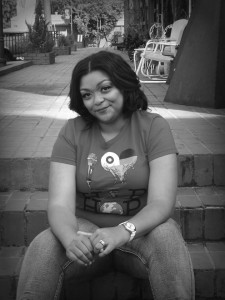 and teaches us about post-Civil Rights African American literature, the contemporary U.S. South, pop culture, race and sound, and Hip Hop. She has two forthcoming articles, “Edward P. Jones’ The Known World and the Hip Hop Imagination” in Southern Literary Journal and “The Messy Organic Intellectualism of Tupac Shakur” in The Journal of Hip Hop Studies. Also known as Red Clay Scholar, a nod to her Georgia upbringing, she is a scholar of many talents. Once you are done relishing and marveling at her words and insights, head over to her You Tube page, her critically acclaimed blog and personal website – www.redclayscholar.com — or check her out twitter.
and teaches us about post-Civil Rights African American literature, the contemporary U.S. South, pop culture, race and sound, and Hip Hop. She has two forthcoming articles, “Edward P. Jones’ The Known World and the Hip Hop Imagination” in Southern Literary Journal and “The Messy Organic Intellectualism of Tupac Shakur” in The Journal of Hip Hop Studies. Also known as Red Clay Scholar, a nod to her Georgia upbringing, she is a scholar of many talents. Once you are done relishing and marveling at her words and insights, head over to her You Tube page, her critically acclaimed blog and personal website – www.redclayscholar.com — or check her out twitter.
Here and there, you are bound to see why many of us love Regina Bradley. She is the future in so many ways – innovative in her teaching, commitment to her work, and always grounded in family, community, and always grounded in transformation, there is so much to love about Dr. Regina N. Bradley. She is also the now. She is not only pushing all of us to be better not only as scholars, writers, and teachers, but as people, as friends, and as colleagues. And that is one of many reasons I, and so many others, love the one and only Red Clay Scholar.
********
DJL: When I approached you about doing an interview and noted that I wanted to feature you in our “Feminist We Love” series, you noted, “But I am not a feminist.” Help me understand how you position yourself and your work?
RB: Let the record show that I have nothing against feminists. Some of my best friends are feminists — LOL. The running joke in my circle is that I’ll eventually give in and come to the dark side. The scholarly answer is that I do not feel I am versed enough in feminism to call myself a feminist. I wasn’t introduced to the term feminism until graduate school. I’ve been labeled a cultural feminist because my work seeks to complicate negotiations of race, gender, and class in popular culture. Black feminist thought heavily influences my critical lens because it allows me to think about marginalized perspectives that are necessary to facilitate change.
The personal answer is that although I’ve been around strong women my entire life, I continue to grapple with finding my own strengths. I think it takes confidence to be a feminist. I’m still putting in work to develop that courage. I’m still making my way to feminism.
DJL: Given your work, its focus on masculinity, it’s investment in social transformation, and in challenging violence, do you see yourself as building on the traditions of black feminist scholarship?
RNB: Yes! My work is built upon the foundation that cultural expression and cultural work are inextricably linked. For example, I am very close to my grandparents. My childhood was filled with stories about our family and their experiences of living in the south. My grandmother, Sara Barnett, frequently speaks of her father, Phil Barkley, who was murdered at a gas station that used to be up the street from our house back in the day. She never got to know him because she was a baby when he died. My great grandmother, Ma Mary, never spoke of him publicly but used stories to remind her children of their father. She kept him alive through stories and memories. As such, I see myself as a story collector and, at times, a storyteller.
I use my work to capture experiences and perspectives that may be overlooked in conversations and scholarship. Black women kept the narratives that shaped my outlook on the world. Black women’s voices are reservoirs of trauma and (cultural) memory. Our voices keep loved ones and their community’s memories tangible when others do not see the value in preserving these marginalized narratives. Black women’s voices acknowledge trauma and actively seek out ways to heal it. I think this is very much a trope of black feminist thought. I strive to produce work that follows a similar model.
DJL: I am very excited to read your forthcoming book. Tell the readers about this book and how it fits within your larger work?
RNB: My first book project, Within and Without, uses black popular culture to explore changing negotiations of race and identity in the 21st century U.S. Specifically, I use hip hop as a framework for thinking about how black popular culture recognizes the tensions blacks in ‘postracial’ America currently face: how to be socially responsible to their race and get paid. Examining a variety of popular culture mediums such as satire, literature, and social media, I suggest that the hip hop aesthetics used in these media highlight the murkiness of postracial identity politics. To work through the messiness of current black cultural expression I offer what I theorize as critical hip hop sensibilities. Critical hip hop sensibilities is the acknowledgement of the commodification of hip hop and the use of its commodification as a lens for negotiating contemporary African American identity. I anchor my excavation of critical hip hop sensibilities by complicating Antonio Gramsci’s theory of organic intellectualism to reflect the messiness of 21st century social protest and profit frequently grappled in the black community. By situating current black popular culture as a messy organic intellectual space, it clears space for marginalized blacks to be seen and heard while simultaneously making black pain and “realness” into commodities to be bartered and sold.
Within and Without centralizes the perspective of black cultural expression as an enterprise in order to address shifting cultural and political paradigms of black agency in a moment where many deem race irrelevant. My book identifies these notions as problematic and a result of idealizing historical strides towards racial progress. By approaching contemporary black culture as a by-product of the ‘shortcomings’ (unfinished business) of the Civil Rights Movement, room is made to complicate romanticized notions of African Americans reaching the mountaintop of racial equality in the 21st century.
DJL: What role does digital technologies play in challenging patriarchy and misogyny within hip-hop?
RNB: Digital spaces are a prominent stage for addressing many issues because of our dependence and investment in technology. Our daily interaction is anchored in social media and the Internet. Additionally, the messiness that we work through offline is amplified online; blurry boundaries of offline reality and online identity make social media a messy digitized space. Because social media is messy it is also a great place to identify shifts in what patriarchy and misogyny look like in current (popular) culture that is fixated on technology. Much like white supremacy, patriarchy and misogyny take on different forms that folks are frequently complicit in thinking about. Hip hop’s presence in digital spaces like social media is particularly interesting because of the parallels between cultural spaces as sites of engagement. They are both interactive and (hyper)performative spaces. Hip Hop’s digital presence opens up conversations and provides access across pockets of folks and communities previously central to the conversation but on the margin of actually changing the discourse.
Yet one setback that I think about is that in the same way that digital spaces are ripe with possibility to be transformative spaces within hip hop its messiness still allows for male privilege to remain a dominant presence. I’ve witnessed many exchanges where rappers dismiss any criticism by women fans because they fail (or refuse) to see a perspective that challenges their own.
DJL: You write about the South – why is it so important to challenge the dominant narratives regarding the South, especially as it relates to Black Popular cultural productions
RNB: As the savant Andre 3000 stated back in 1995: “[‘Cause] The South got something to say!” The south STILL got something to say! It irks me to no end the level of comfort that folks have dismissing the American south as a contemporary space. Further, it irks me that when conversations DO come up about a functioning, contemporary south it is a white contemporary south – the experiences that are validated, profitable, and capture the mainstream’s attention are usually reality television or country music. It is important to complicate southern black cultural expressions because southern blackness is complicated. It is not a blanket of white pride and black paranoia. It is much bigger than that. Southern black folks are magic. I want to make sure that our magic gets its due.
The American south, especially the black American south, is much more than what a detached national audience consumes in pop culture. It makes folks uncomfortable to think about black folks functioning and living in the south after the civil rights movement. I call this dilemma the 1968 question: what does blackness in the south look like after the death of MLK and the trailing off of the momentum surrounding the Civil Rights Movement?
While I am very familiar with the struggles and challenges faced by black folks during the Civil Rights era, it is not an experience that informs my day-to-day dealings. Jim Crow is not a dude I see walking down the street. I snatch glimpses of him, but he makes little to no physical impact on my daily experiences. He is not tangible in the way(s) he was tangible for my grandparents, aunts, and uncles. I’m an ‘80s baby. What is a major way that southern blackness is expressed in the last 50 years? Hip Hop! I argue that southern hip hop serves as a time portal: it recognizes and respects past experiences of blacks in the Antebellum and Jim Crow south while speaking to contemporary trends that affect post-Civil Rights generation members. When Andre 3000 emphatically states “The South got something to say” I read it as a call to arms for my generation of southern black folk(s): what do we have going on that demands a new set of practices and language? Kiese Laymon, Brittney Cooper, John Jennings, Zandria Robinson, Langston Wilkins, Maco Faniel, and others are doing exactly that: showing that the south still got something to say and how to address it. We out chea workin’.
DJL: You have recently started an online show – Outkasted Conversations? How did this come about and why was it important to create this space?
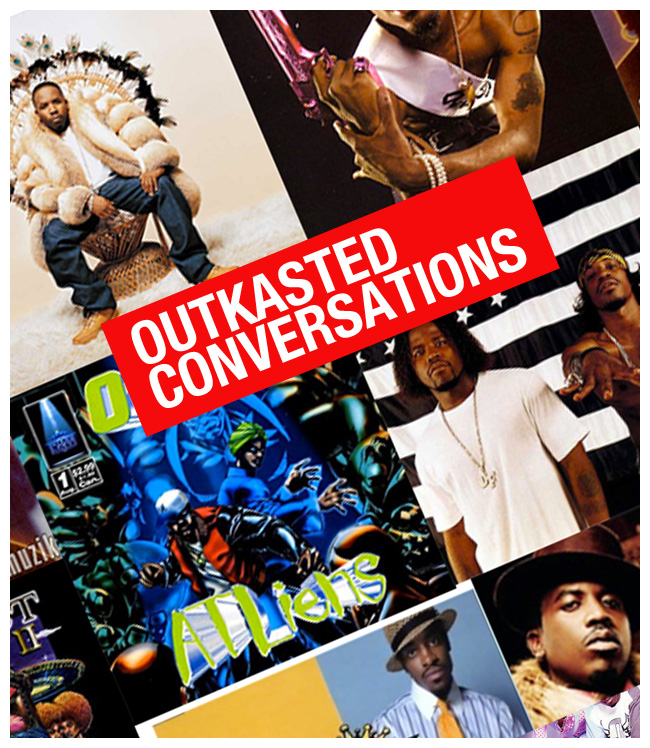 RNB: I’m a diehard Outkast fan. I love those dudes like I love fried okra and skin meat (strick o’ lean for the uninitiated), like they’re my play play cousins. My initial introduction to Outkast was the Players Ball episode of Martin but it was not until 1998 that I became “Outkasted.” I walked the roads by my folks’ house listening to cicadas, rustling trees, and my Walkman. We lived in the field: melon and cornfields surrounded my house and two plantations were adjacent to us. As I walked the roads, Aquemini and Still Standing were staples on all of my mixes. The Dungeon Family was my initiation into being a Down South Georgia Girl.
RNB: I’m a diehard Outkast fan. I love those dudes like I love fried okra and skin meat (strick o’ lean for the uninitiated), like they’re my play play cousins. My initial introduction to Outkast was the Players Ball episode of Martin but it was not until 1998 that I became “Outkasted.” I walked the roads by my folks’ house listening to cicadas, rustling trees, and my Walkman. We lived in the field: melon and cornfields surrounded my house and two plantations were adjacent to us. As I walked the roads, Aquemini and Still Standing were staples on all of my mixes. The Dungeon Family was my initiation into being a Down South Georgia Girl.
This year is the 20th anniversary of Outkast’s presence in hip hop. It is important to make room to celebrate their contributions to not only to hip hop but popular culture in general. They really changed the game on multiple fronts. Outkasted Conversations is not only a tribute but also a critical dialogue series that calls upon scholars, fans, and artists to speak about Outkast’s cultural impact. I want to archive their presence from a host of perspectives, making critical thought and pop culture accessible to a larger audience.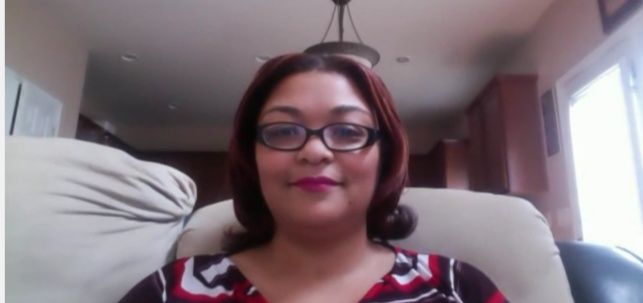
DJL: Who are your feminist/womanist s/heroes? And how have their lives and work impacted your own?
RNB: My mother and grandmother foreground what I embrace as empowerment and “the grind.” They helped me think about my life as intricately connected layers of experience, faith, and action. However, Joan Morgan’s credo “I need a feminism that fucks with the grays” in her hip hop feminist manifesto When Chickenheads Come Home to Roost was a game changer. I adopted it as a personal mantra, not necessarily as my way to feminism but as a way to approach my work. Fucking with the grays means embracing the messiness of being a critical consumer of a culture that doesn’t always love you back.
I take pride in the fact that my s/heroes “declutch the pearls.” They get messy. They are fearless and bright in their research and in their daily living. They are what Imani Perry describes as “trilliant.”
DJL: You have written many powerful pieces so it’s hard for me to pick one, but your piece “Fear of a Black (In The) Suburb” is so powerful in its connection between sonic and the realities of white supremacist violence; it demonstrates the ways we must connect material analysis with conditions on the ground. Why was this piece so important to write and what does your approach here tell readers about your work
RNB: I still sting from Jordan Davis’ death. I am indebted to Sounding Out! for helping me polish my ideas about the piece. The initial drafts were everywhere because my visceral reaction trumped my critical lens. I wrote “Fear of a Black [in the] Suburb” to remind people that Jordan Davis still mattered. I wanted to force people to realize that the double standard and interchangeability of white paranoia and white privilege did not solely exist in a physical and textual sense. Jordan Davis died for his listening practices; listening practices that captured not only his sense of self but the threat imposed upon him by Michael Dunn. Sound is an underutilized frame of analysis because it lacks the tangibility that other facets of cultural work entail. I gravitate towards using it in my research because it is a richly ambiguous space for applying alternative methods of analysis that reflect the increasingly ambiguous intersections of race, gender, and class in American culture.
I wrote “Fear of a Black [in the] Suburb” to remind people that Jordan Davis still mattered. I wanted to force people to realize that the double standard and interchangeability of white paranoia and white privilege did not solely exist in a physical and textual sense. Jordan Davis died for his listening practices; listening practices that captured not only his sense of self but the threat imposed upon him by Michael Dunn. Sound is an underutilized frame of analysis because it lacks the tangibility that other facets of cultural work entail. I gravitate towards using it in my research because it is a richly ambiguous space for applying alternative methods of analysis that reflect the increasingly ambiguous intersections of race, gender, and class in American culture.
DJL: You have used social media in really innovative ways with respect to your teaching; why is it so important to utilize these technologies in the class
RNB: Because the world isn’t restricted to classrooms! As a pop culture scholar it is critical to engage pop culture outside of the classroom where the consumption and production of pop culture takes place. Perhaps my most important intervention to new media pedagogy to date is the #TeachingTrayvon hashtag. I started this hashtag to archive the responses of my students to Martin’s death and as a way to recognize that the remembrance of Martin’s death and humanity is grounded in social media. Because social media is messy, it allows for less than perfect/messy individuals to retain the right to be mourned. Each semester, I dedicate a week to engaging my students about the impact of Trayvon Martin’s death. The hashtag allows for folks who are not in my classroom to engage our conversations. Using social media challenges students to become well-rounded thinkers and a means to integrate the skills they learn in my classes into other spaces.
DJL: What role does social media and online communities play in facilitating change?
RNB: Social media allows for the concerns of race and community to rematerialize and push back against the dismissal of race and identity politics offline. Digital spaces are flexible enough to make racial anxieties and concerns tangible in a moment where even mentioning race is shunned. For example, I can’t campaign or sing the praises enough for the Dream Defenders who  have revolutionized hip hop and social justice in digital spaces. They have created a sense of community and agency using hip hop and new media. Their memes and hashtag campaigns – i.e. #GoodKidsMadCities and #TheyNeverLovedUs – create points of access for critical analysis to those who may not be affiliated with the academy. These alternative veins of critical thought allow for social transformation to take place. Blend pop culture and digital media and voila – tools for changing the game!
have revolutionized hip hop and social justice in digital spaces. They have created a sense of community and agency using hip hop and new media. Their memes and hashtag campaigns – i.e. #GoodKidsMadCities and #TheyNeverLovedUs – create points of access for critical analysis to those who may not be affiliated with the academy. These alternative veins of critical thought allow for social transformation to take place. Blend pop culture and digital media and voila – tools for changing the game!

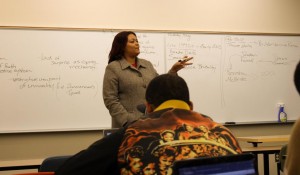


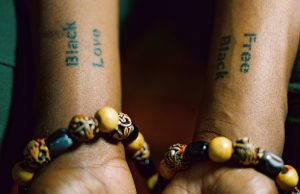
0 comments